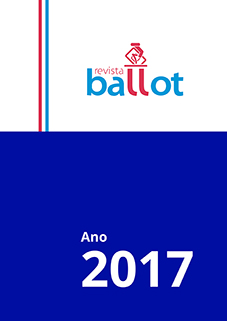Abstract
Undeniably, in recent times Brazil has been plagued by great scandals of corruption, money laundering and usurpation of public functions to satisfy private interests, mainly in the political field, involving actors elected by the people in the exercise of their democratic rights. Thus, the whole country becomes the scene of an intense political, moral and social crisis, which causes total discredit to the population in relation to the electoral process, which in most cases is not performed by the nominees with the objective of satisfying the interests of the population. ln this context, it is relevant to see the appearance of the "Lei da Ficha Limpa" (Complementary Law 135), which had its constitutionality ratified in 2012 by the Federal Supreme Court. It has entered into the legal system aiming to surround the electoral mandates and their exercisers of guarantees of honesty and honesty, in order to curb corrupt practices and to hinder access to the elections with more severe sanctions against agents condemned for the whitecollar crimes, such as response to the society of the yeaming for a serious and just policy, in which the voters do not become simple coadjuvantes in the electoral process, but main actors. However, on March 1, 2018, a Supreme Court decision significantly altered the scope of said law, specifically with respect to the eligibility criterion provided for in Article 2 (h). It provides a penalty of 8 years of ineligibility for holders of direct, indirect or foundational public administration who benefit themselves or others and who are condemned in a final decision or rendered by a collegiate judicial body for committing abuse of economic power or political, while that decision decided to extend this sanction to the convicted before 2010, year of entry of the norm to the Brazilian legal system. Thus, the study aimed to analyze this recent decision of the STF that decided to apply the "Lei da Ficha Limpa" (Complementary Law 135) to those convicted before 2010, the year of its promulgation. According to the new understanding of the court, those condemned for abuse of economic or political power even before the promulgation of the law must submit to their legal consequences of ineligibility in the next 8 years, thus being prevented from disputing the election year of 2018. This work is justified by the relevant practical consequences that this decision generates for the alleged candidates sentenced in the years before the edition of the aforementioned legal norm, which become ineligible for the elections that will happen in this year. Thus, the hypothesis of ineligibility are amplified, since there is an increase in the number of subjects affected by this norm, who have their political rights limited. Thus, using the methodology of bibliographic review, the issues related to this decision were studied, analyzing the role of the Supreme Court in the legal system, the motivations for editing the "Lei da Ficha Limpa", and the possible unconstitutionality of this understanding before the principie of non retroactivity of the criminal law to harm the defendant, in force in Criminal Law.Os Direitos Autorais dos trabalhos publicados na revista BALLOT continuam pertencendo aos seus autores, que autorizam, ao inscrever-se no processo de submissão, a divulgação do seu conteúdo nesta plataforma para o acesso livre pela internet, devendo sempre ser citada a fonte. Pessoas interessadas em reproduzir parcialmente os artigos desta revista (partes do texto que excedam a 500 palavras, tabelas e ilustrações) deverão ter permissão escrita do(s) autor (es).
A Revista Ballot obedece aos termos da licença Creative Commons 4.0 (http://creativecommons.org/licenses/by-nc-nd/4.0/), atribuição não comercial e sem derivações, em consonância com a legislação autoral brasileira, Lei 9.610/98.

Este trabalho está licenciado com uma Licença Creative Commons - Atribuição-NãoComercial-SemDerivações 4.0 Internacional.
Downloads
Download data is not yet available.

